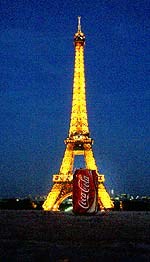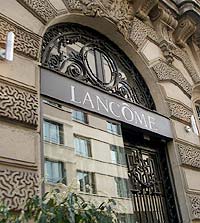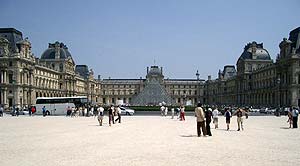OK, I just e-mailed my dad requesting food. How absurd, you
say — why would an American ask for food to be sent
to France, world capital of culinary delights? One word:
COST. One dollar
gets me 0.85 euros. Not only are prices inflated in Europe
(a bottle of Coke in a restaurant is 5 euros), but the euro
is
also stronger than the dollar (those 5 euros equal 7 dollars).
With two economic currents fighting against my wallet, I have
but no choice to ask for EasyMac and spaghetti to be sent via
parcel post. Unfortunately that's the experience of the other
interns and other American citizens in France: how little the
dollar buys you.
 But after talking with my boss, I learned that in this case, there's more going on than the numbers. The cost of Coke is higher for numerous reasons, such as brand, being in a restaurant (it’s more expensive to have Coke sitting down in one versus take-out), and the culture itself doesn’t depend on it as much as Americans do. For instance, Orangina soft drinks are a lot cheaper here than in the U.S. It’s amazing how an experience with Coke taught me a subtle difference in consumer culture.
But after talking with my boss, I learned that in this case, there's more going on than the numbers. The cost of Coke is higher for numerous reasons, such as brand, being in a restaurant (it’s more expensive to have Coke sitting down in one versus take-out), and the culture itself doesn’t depend on it as much as Americans do. For instance, Orangina soft drinks are a lot cheaper here than in the U.S. It’s amazing how an experience with Coke taught me a subtle difference in consumer culture.
Bon Appetit! at a great pace
Don't get me wrong, I've had a great share of French food this week. Food here is amazing, delicious, and filling. People wonder why Europeans are more fit than Americans, and I think I might know. Serving more complete meals and eating at regular intervals fares better than cramming junk food throughout the day. I feel that I've become more fit here by virtue of food alone. For instance, the typical breakfast is a croissant or baguette along with a super power shot of "healthy" espresso coffee. That normally carries you to lunch, which is either a large salad or some type of dish with cheese and bread. The breakfast and lunch are just enough to last you through the day, and finally at dinner it pays off with a nice slab of veal, steak, or fish — with, of course, vegetables, excellent French wine, and a dessert.
An extra note on French wine: it is so great that I can’t understand how a principle led people in the U.S. to dump it. Wine here is amazing... it's as if each one is a luxurious $200 bottle from Napa, when actually it's a $5 bottle from the next-door grocery. How it makes meals healthier, I haven't figured out — but it seems to work.
As for food, people enjoy dinners here more than in America. For instance, when I'm in a restaurant, I've noticed that it takes two hours for the waiter to bring the bill, even when I'm the only one in there! It's because people enjoy the time and food here, something that would be great in the States.
 An added bonus is that it doesn't get dark here until 10:30 p.m., so it's typical for people to go to a bar or café after work, spend a couple hours, and then move onto dinner. Life is a lot more relaxed but still maintains its seriousness.
An added bonus is that it doesn't get dark here until 10:30 p.m., so it's typical for people to go to a bar or café after work, spend a couple hours, and then move onto dinner. Life is a lot more relaxed but still maintains its seriousness.
I've learned to take it easy now after eating; instead of waiting for the
bill to leave, I'll spark a random conversation in my (attempting to be) perfect
French with someone. I've had interesting conversations with other working
people, other college students, and even young kids — not always about politics, but about the French Open (disappointing for the USA!), some attractive woman that walks by, or what's going on in Paris that night. It's a great café culture that Berkeley also has somewhat... minus the stress, the wackiness, and the need to do things at 500 miles per hour.
We're not in America anymore
Having been in Paris for one week I've noticed subtle differences. The larger differences — like living arrangements, language barriers, and different style of living — were actually easy to overcome, as I've lived in dorms, and Berkeley itself has given me a diverse experience of life.
But it's the small differences that are beginning to itch. For instance, nothing
is ever open. Hours for business in many stores in my neighborhood are 9 a.m.
to 6 p.m., conveniently during the time I work at the Embassy. Hence, I don't
have
the opportunity to buy anything, whether clothes or groceries. The only time
I can purchase my goods is on Saturdays, since stores are closed on Sundays.
It is not hard to accommodate, except when an emergency comes up, like when
I needed a phone card and had to walk eight blocks to the smallest hole-in-the-wall
grocery store to finally find one. It's more funny than frustrating; I'm used
to a Kinko's, a 7-11, or a Denny's open all night. Here, it's a challenge.
 I live in quarters provided by the U.S. State Department, which is situated in one of the safest quarters in Paris. It is also adjunct to one of the richest — perhaps the richest — district as well. The 10-minute walk to work intimidates me as I pass by the main stores of Chanel, Versace, Ferragamo, YSL, Cartier... every posh French name you can imagine. I wonder what the store owners think of the students who fumble by in American clothing...!
I live in quarters provided by the U.S. State Department, which is situated in one of the safest quarters in Paris. It is also adjunct to one of the richest — perhaps the richest — district as well. The 10-minute walk to work intimidates me as I pass by the main stores of Chanel, Versace, Ferragamo, YSL, Cartier... every posh French name you can imagine. I wonder what the store owners think of the students who fumble by in American clothing...!
Because of security concerns, people who wish to enter the embassy must have an identification card. That's where I get my big head for the day — nonchalantly flashing my ID with my name and picture makes me feel important.
So after one week I feel I'm well situated...nine weeks left! Can't wait to
see how they turn out.
—Puneet




 But after talking with my boss, I learned that in this case, there's more going on than the numbers. The cost of Coke is higher for numerous reasons, such as brand, being in a restaurant (it’s more expensive to have Coke sitting down in one versus take-out), and the culture itself doesn’t depend on it as much as Americans do. For instance, Orangina soft drinks are a lot cheaper here than in the U.S. It’s amazing how an experience with Coke taught me a subtle difference in consumer culture.
But after talking with my boss, I learned that in this case, there's more going on than the numbers. The cost of Coke is higher for numerous reasons, such as brand, being in a restaurant (it’s more expensive to have Coke sitting down in one versus take-out), and the culture itself doesn’t depend on it as much as Americans do. For instance, Orangina soft drinks are a lot cheaper here than in the U.S. It’s amazing how an experience with Coke taught me a subtle difference in consumer culture. An added bonus is that it doesn't get dark here until 10:30 p.m., so it's typical for people to go to a bar or café after work, spend a couple hours, and then move onto dinner. Life is a lot more relaxed but still maintains its seriousness.
An added bonus is that it doesn't get dark here until 10:30 p.m., so it's typical for people to go to a bar or café after work, spend a couple hours, and then move onto dinner. Life is a lot more relaxed but still maintains its seriousness.  I live in quarters provided by the U.S. State Department, which is situated in one of the safest quarters in Paris. It is also adjunct to one of the richest — perhaps the richest — district as well. The 10-minute walk to work intimidates me as I pass by the main stores of Chanel, Versace, Ferragamo, YSL, Cartier... every posh French name you can imagine. I wonder what the store owners think of the students who fumble by in American clothing...!
I live in quarters provided by the U.S. State Department, which is situated in one of the safest quarters in Paris. It is also adjunct to one of the richest — perhaps the richest — district as well. The 10-minute walk to work intimidates me as I pass by the main stores of Chanel, Versace, Ferragamo, YSL, Cartier... every posh French name you can imagine. I wonder what the store owners think of the students who fumble by in American clothing...!